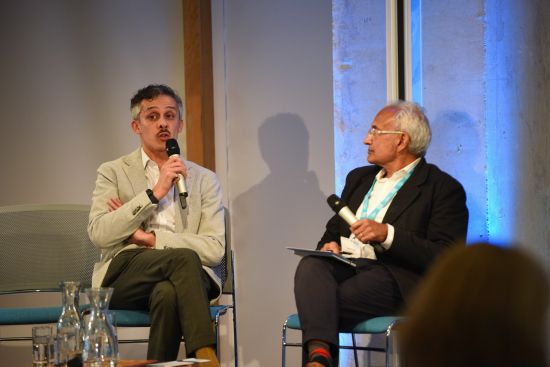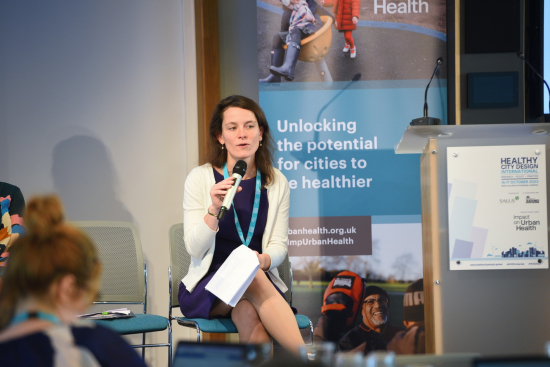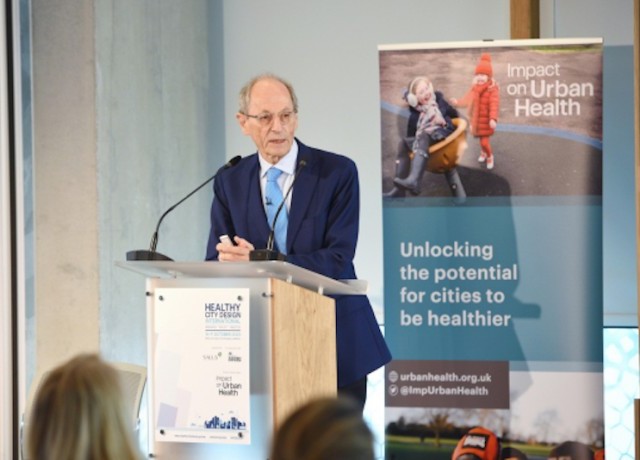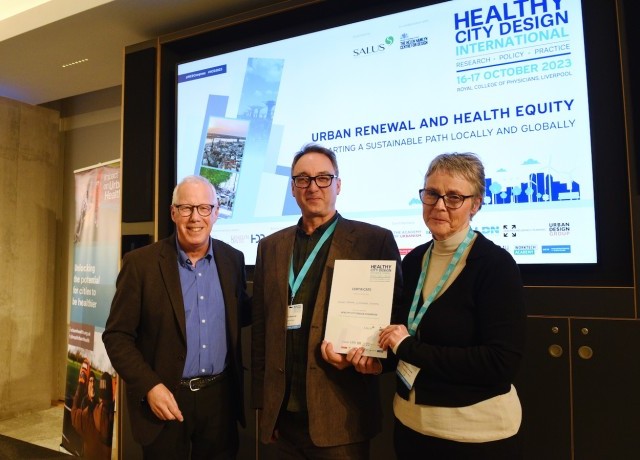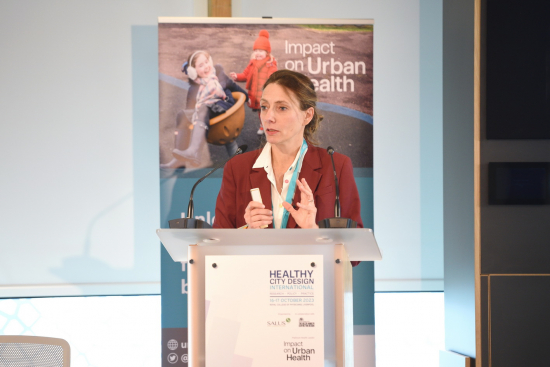
Keynote summary: A strategic approach to urban health
Dr Nathalie Roebbel’s keynote talk at the Healthy City Design International Congress in Liverpool provided an update on the World Health Organization’s (WHO) work on improving urban health through a strategic approach – making the case and making it work.
Speaking in her capacity as unit head – urban health at WHO, she noted that despite a growing recognition of the importance of the role of cities in improving health and local action for health, despite of a growing number of tools and initiatives, and despite the awareness of a multitude of determinants that need to be addressed within cities, work in this area is often too siloed and sectoral.
The agency is currently developing a strategic guide for urban health, which aims to make the case for an integrated approach to urban health while also setting out some concrete recommendations. This strategic approach, Dr Roebbel explained, aims to make the case from an epidemiological, economic and a social value or health equity perspective.
An integrated and holistic approach to urban health, she added, means that the myriad processes we’re facing on a daily basis – whether it be demographic challenges, the changing climate, economic hardship, etc – are “interlinked and can actually be used to address health”.
She pointed to four areas that can help bring an integrated approach to urban health to the fore, and the mechanisms identified that will help scale up work on urban health: generating and working with evidence; governance and financing; innovation; and partnerships and participation. A policy brief series to support strategic action on urban health – focusing on each of these four areas – will be published in 2024.
She emphasised, too, the need to define processes for choosing the right indicators that fully represent urban health, as this will help bring sectors together; help identify the priority areas for specific contexts; help align with existing frameworks; and ensure multi-level coherence.
Another important question is how one manages and uses the data once it has been collected. Here, there is a need to adopt processes and standards for managing urban health data that increase its utility; foster applied analysis of urban health evidence; and consider how to invest in the technology for retrieving the data.
There also needs to be a mechanism to establish a whole-of-government political mandate for urban health, Dr Roebbel said – “a legal framework that says urban heath data is co-owned, co-shared, co-managed”.
If you don’t have the capacities for interacting, or for understanding the same data, you will not talk or use the same data
Training on building capacities
Alongside the policy brief series, the agency is also developing a training programme to enable local action. The training programme aims to help build capacities in engaging with intersectoral mechanisms on urban health, since, according to Dr Roebbel, “those capacities are often not in place, they are not in place at the local level and not in place at the national level”. Furthermore, she added, “if you don’t have the capacities for interacting, or for understanding the same data, you will not talk or use the same data”.
Key areas identified for developing a ‘Capacities for Urban Health Framework’ are: observation and analysis; policies, programmes, innovation and change; allocating human and financial resources; and partnerships, social participation and knowledge sharing – to engage on urban health.
Delivered through the WHO Academy – a training institution for practitioners to strengthen competencies and capacities for health – the training programme is a recognition that health is not only managed at the national level but, most importantly, at the local level. It also recognises, noted Dr Roebbel, that health needs “intersectoral collaboration – you don’t only need to train health professionals, you need to train all those stakeholders and sectors that will have an impact”.
Assessing skills and capacities
An assessment tool is also under development, with the aim of allowing any individual or organisation to assess whether they have the capacities in place. The tool is being piloted by the Greater London Authority, which is looking at maximising the potential to improve health inequalities of Londoners through capitalising on London’s creative assets – in effect, creating health through culture or a ‘Creative Health City’.
To realise this ambition, it saw that it needed to increase collaboration with multiple partners across sectors but didn’t have the necessary skills. As well as identifying that qualitative data is very expensive, it recognised that it had insufficient quantitative data analysis expertise.
The assessment tool has helped them understand the gaps that need to be addressed, said Dr Roebbel, and the direction in which it needs to move in order to strengthen collaboration to improve urban health at the local level.
Given that a strategic approach to urban health is about how the city functions within and in relation to many other issues and processes, it’s hoped that the combination of the policy brief series, the training programme, and the assessment tool can help build skills, capacities, engagement and collaboration across different sectors and multiple levels to deliver an integrated and holistic approach to urban health. At such multi-sectoral and multi-level intersections is where true change can really happen.
Event news
Investing in urban renewal and health equity
21st March 2024
Health equity: Marmot Cities
20th March 2024
Housing and health equity
20th March 2024



